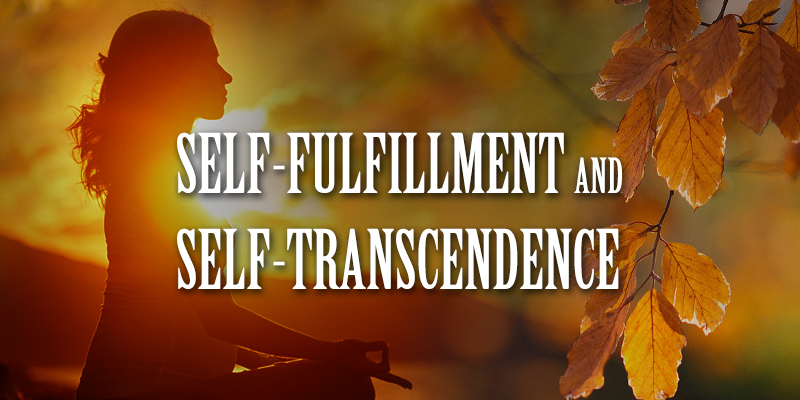
SELF-FULFILLMENT AND SELF-TRANSCENDENCE
The influence of self-theorists starting from psychoanalytic ego psychologists such as Heinz Hartmann, Anna Freud, Adler, Jung, Horney and Rank reaching the pure and very leading self-theorists such as Erich Fromm, Carl Rogers, Abraham Maslow and Rollo May have initiated a culture that exalts the self. In the words of E. Fromm, “ I shall attempt to show that the character structure of the mature and integrated personality, the productive character, constitutes the source and basis of “virtue” and that the “vice”, in the last analysis, is indifference to one’s own self and self- mutilation. Not self-renunciation nor selfishness but the affirmation of his truly human self are the supreme values of humanistic ethics. If man is to have confidence in values, he must know himself and the capacity of his nature for goodness and productiveness”. In the words of C. Rogers, “If I can create a relationship characterized on my part: by a genuineness and transparency, in which I am my real feelings; by a warm acceptance of and prizing of other person as a separate individual; by a sensitive ability to see his world and himself as he sees them; then the other individual in the relationship: will experience and understand aspects of himself which previously he has repressed; will find himself becoming better integrated, more able to function effectively; … will be more self -directing and self-confident … more unique and more self-expressive. … we have here a general hypothesis which offers exciting possibilities for the development of creative, adaptive, autonomous persons”. Abraham Maslow enumerating the various innate human needs reaching the highest level of self-actualization or self-realization leading to creativeness, akin to the ” naïve and universal creativeness” of unspoiled children . According to Rollo May, the self first exists but without any apriori nature or essence. The self’s essence is created through acts of choice. The process of development of the self-potential is called “becoming”, through the interaction with the external environment (Umwelt ), social and inter-personal environment (Mitwelt) and its own world (Eigenwelt).
The selfists have an extremely exaggerated conviction of the intrinsic good of the human nature and deny the social functionality and psychological validity to the concepts of sin and temptation and of original sin due to human carnal animal nature. Selfism is a consumer philosophy ideally suited for those with money and leisure. The typical attitude of selfism is expressed in the attitude: “I love me. I am not conceited. I am just a good friend to myself. And I like to do whatever makes me feel good.” So selfism is idolatry because it is the worship of the self. “Today in the secular world creativity is simply a gift, from the self to the self, it has degenerated into a synonym for any form of personal pleasurewithout reference to others” In reality how can a person express his individual capacity in a creative way depending on one’s self alone and without aligning himself with God who is the source of all creativity? “Real creativity requires a soul cooperating with God , a soul who becomes God’s loving agent in all its activity however mundane”. The words of Meister Eckhart are quite relevant here: “self-love is the root and cause of all evil, depriving us of all goodness and perfection. Therefore if the soul is to know God it must forget and lose itself so long as it mirrors its own image it does not see or know God”. Irving Kristol recapitulates the idea: “We really do believe that all human beings have a natural telos toward becoming flowers, not weeds or poison ivy, and aggregates of human beings have a natural presupposition to arrange themselves into gardens, not jungles or garbage heaps”.
“The individual Christian at least if he is serious, has many guides to keep him away from extreme selfishness. First of all, love of God expressed in faith and in meditative and contemplative prayer, the awareness of the potential for sin and need to be alert to the traps of sin, there is the Christian community around, sacraments like confession, Eucharist etc… all these help the Christian not only not to yield to selfishness but also to arrive at higher levels of love and knowledge”. Christianity starts with suffering and ends with joy. Selfist humanism starts with optimism but ends with pessimism. This pessimism is depressing since it has many religious traits but is a kind of false or substandard. “Humanist selfism is not a science but a popular secular substitute religion which has nourished and spread today’s wide spread cult of self- worship. We have a full generation deeply influenced by selfism.
The actual society is developing itself into a selfist one and the destructive negative effects of the same in the human life evident. But true human life is centred on the awareness of the other as an inevitable source of meaning in life and the altruistic attitude as the only basic means, without an alternative, to reach the experience of this meaning. This demands the discovery and experience of THE OTHER ie. God as the foundational substratum of human existence, who empowers them to transcend themselves and to experience the self-less communion with the whole universe. The art of reaching this experience is prayer (the spiritual value) and the value that motivates a person to venture on learning this art is self-denial (the Gospel value). The emerging culture is cosmic, inclusive, symbolic and dynamic. This will catalyse the transformation of our society from selfist to self-less one. Is not this the essence of consecrated life and of its pragmatic function?
Share on Facebook Share on Twitter Share on Pinterest